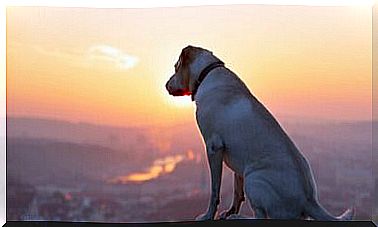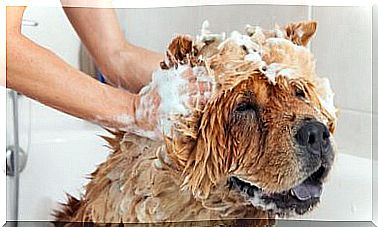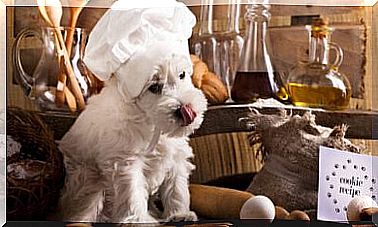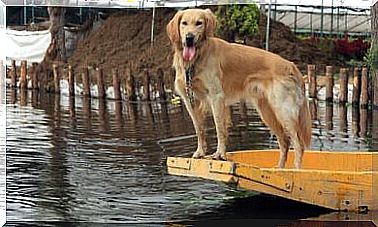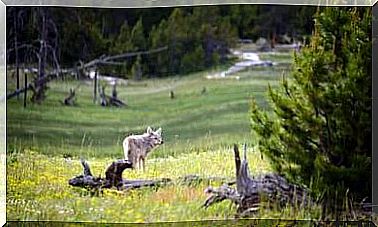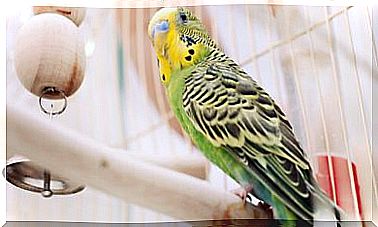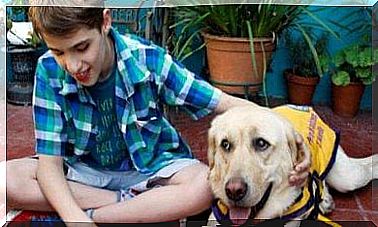What Are A Dog’s Nutritional Needs?
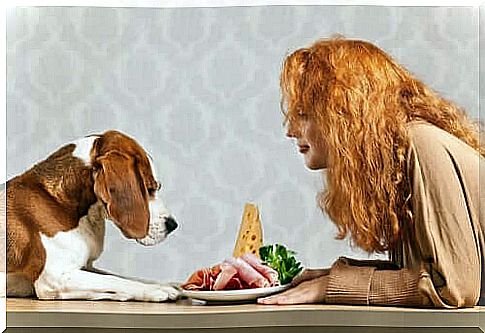
Many pets depend on humans for their nutrition. In ancient times, most animals were able to select a wide range of foods to feed on. As a result of domestication, however, most of them have lost this ability. For this reason it is important to know a dog’s nutritional needs .
In general, dogs need a whole range of nutrients starting with water, which is essential for staying hydrated and transporting the rest of the nutrients around the body. At the base of their structure and their motabolism we find then the carbon hydrates, lipids and proteins.
Finally, we find the vitamins and minerals, essential for the complete well-being of the animal. All these substances allow the dog to carry out its vital functions. Let’s find out more about all a dog’s nutritional needs.
Water is the foundation of a dog’s nutritional needs
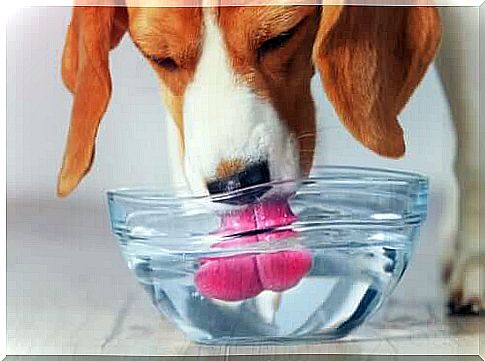
Water isn’t just essential for maintaining hydration. Thanks to it, in fact, the dog’s body is able to carry out the reactions necessary to synthesize and assimilate nutrients during digestion. We can therefore say that water is the lifeblood of our four-legged friends.
It is important to know that pets’ need for hydration varies depending on whether they are puppies, adults or senior dogs. Dogs can take water by drinking it directly as well as through food, or thanks to the so-called metabolic water. This is generated by the chemical oxidation reactions typical of organisms.
The energy of nourishment
Energy or caloric density is the amount of energy that we can find in a unit of food. This is identified in calories or kilocalories (Kcal). Depending on its formulation, each food can provide more or less energy to animals.
- 1 gram of fat provides 9.4 kcal
- 1 gram of protein provides between 5.3 and 5.8 kcal
- 1 gram of hydrates provides between 3.3 and 4.3 kcal
In order for the dog to be healthy, it is essential to avoid energy imbalance. It is therefore necessary to avoid giving the dog an energy intake more or less high compared to what it will be able to dispose of in a day. Otherwise, you risk the state of obesity or malnutrition.
Carbon hydrates for the dog
Carbon hydrates are composed of carbon, hydrogen and oxygen. Carbohydrates can be classified in different ways, such as according to their degree of absorption, if they digest or pass directly to the digestive system, if they ferment in the intestine and so on.
These substances are essential for maintaining the body and are assimilated in the form of glycogen. Hence glucose, which is essential for the functioning of the nervous system.
The needs for carbon hydrates in dogs are not fully known, the only thing that is known is that they vary according to age or physiological state.
However, dogs have metabolic pathways that synthesize carbohydrates, so they don’t need to get them through their diet. They are mainly carnivorous animals, and in nature they obtain hydrates from the glycogen stored in their prey.
Since they are not a necessary requirement in a dog’s diet, you can choose a food rich in carbohydrates such as cereals or simple treated dog food, which is much cheaper, to give them grains.
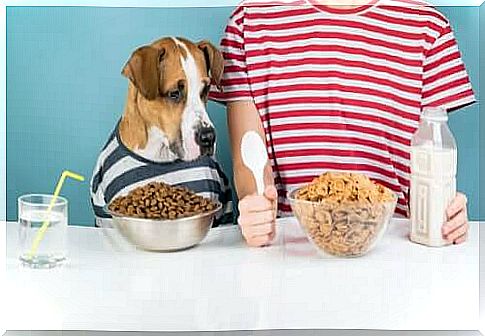
Lipids or fats in the diet of dogs
Fat is one of a dog’s nutritional needs. In addition to being the main energy reserve, they have many structural and metabolic functions for the body:
- They are found around nerve fibers to protect them.
- Cholesterol, a type of lipid, is a precursor to certain hormones.
- They make up lipoproteins, which promote the movement of fats in the blood.
- They are structural elements of cell membranes, in the form of phospholipids and glycolipids.
- Being in the membranes, they are responsible for transporting nutrients in and out of the cells.
Through lipids, dogs obtain essential fatty acids, such as omega-6 and omega-3. The exact quantities of these nutrients to be included in a dog’s diet are not yet known. However, it is known that the omega-3 concentration must be higher.
Nutritional needs of a dog: proteins
Proteins are macromolecules whose basic unit is amino acid. The functions that proteins perform within the body are innumerable, here are some of them summarized:
- They are part of the antibodies.
- They form many hormones.
- They are a fundamental part of the muscles.
- Collagen is made up of proteins.
- In the blood they carry oxygen and carbon dioxide.
- They are essential in the digestion and assimilation of nutrients.
- As enzymes, they have catalytic properties in metabolic reactions.
- They form the hair, nails, tendons, ligaments and cartilages.
The ability of a dog to digest and assimilate the proteins included in his diet mainly depends on the biological value of these. Although a feed can be very high in protein, it may be that the dog is unable to absorb any of them.
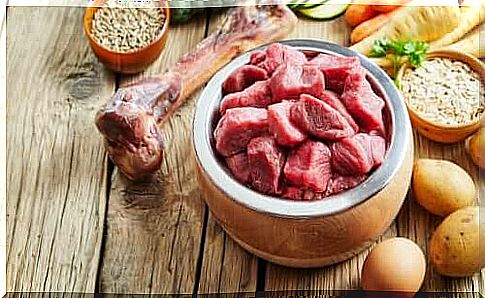
Vitamins and minerals
Vitamins are substances required in minimal quantities, but if present in excessive or insufficient quantities, they can ruin the body. This is due to their very specific structural or metabolic functions.
There are fat-soluble vitamins that are assimilated and stored mainly in the liver. They are the vitamins of groups A, D, E and K. On the other hand there are water-soluble vitamins, which are absorbed and excreted quickly through the urine. This is the case with the B and C vitamins.
Finally, we find minerals or mineral salts, a set of inorganic elements essential for a dog’s nutritional needs. They are the following: calcium, phosphorus, magnesium, sulfur, iron, copper, zinc, manganese, iodine, selenium, cobalt, sodium and potassium.
